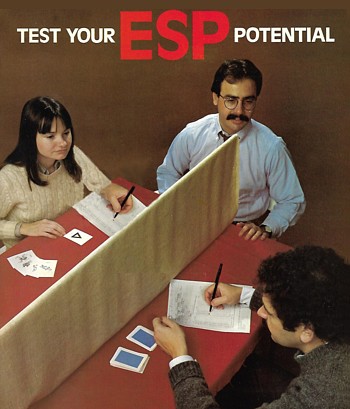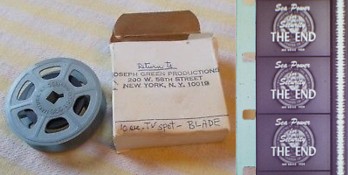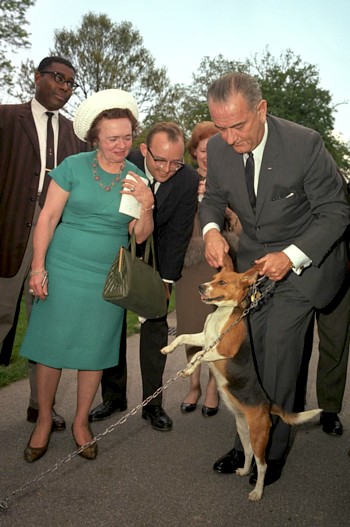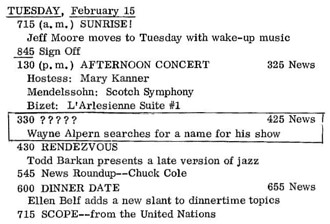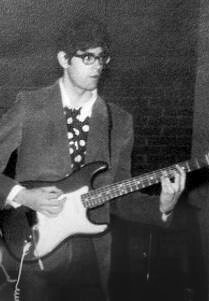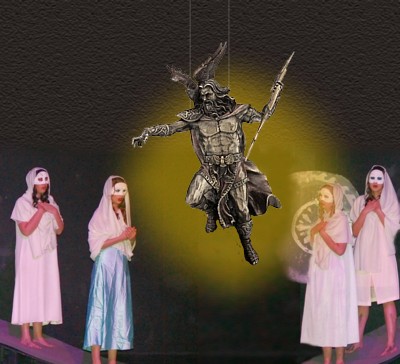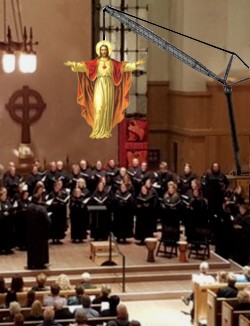DEC.
31, 2008 ![]() NOT
ENOUGH HOURS IN THE DAY
NOT
ENOUGH HOURS IN THE DAY
A "day" is one rotation of the Earth. But that's not precise enough for atomic clocks that track Coordinated Universal Time (UTC). For them, a "day" is 794,243,384,928,000 periods of the radiation corresponding to the transition between the two hyperfine levels of the ground state of the cesium-133 atom.
However, there's a problem: The Earth takes just a bit longer than this to rotate, the amount varying with global weather conditions and the like. So every few years, a "leap second" has to be added to UTC to keep it from getting too far ahead of the slowing planet.
One of those seconds will be added tonight, between 11:59:59 pm and midnight. But don't expect to see the lighted ball in Times Square pause just before completing its descent. The leap second will have already been added five hours before, at midnight UTC = midnight in London = 7:00 pm in New York.
Back in April, someone named “ShaunL” posted a note on the Internet suggesting that we could get more accomplished if there were 926,617,282,461,000 periods between one midnight and the next.
Maybe we should slow down the rotation of the Earth, giving us 28-hour days. We just need to get everyone in the world to grab something solid and all yank to the left at the same time.
And someone named “Robin” replied:
When I was little, I knew a computer programmer at my dad's work who operated on a week of six 28-hour days instead of seven 24-hour ones. His week synchronized with other people's at midnight on Friday, so he was roughly in phase with other people for weekend socializing but had the office to himself on his (four) weekdays.
I've toyed with concepts like this myself. Flying across the Pacific Ocean in 1988, I tried to minimize the effects of jet lag by briefly putting myself on a 32-hour day.
Therefore, I had to check out Robin's dad's colleague's schedule. How does it mesh with the schedule that we ordinary 24-hour people use?
Let's refer to ourselves as Sols, and let's call the 28-hour guy the Programmer. Let's use "military time" in which 00:00 means midnight, the start of a new day. For Sols, one minute before midnight is 23:59. For the Programmer, it's 27:59.
Everybody gets Saturday and Sunday off, denoted by a tan background in the charts below. Let's assume the other days are divided like this:
|
SOLS |
PROGRAMMER |
|
|
Sleep starting at midnight |
8 hours, 00:00 to 07:59 |
8 hours, 00:00 to 07:59 |
|
Arise, commute |
2 hours, 08:00 to 09:59 |
2 hours, 08:00 to 09:59 |
|
Work (40-hour week) |
8 hours, 10:00 to 17:59 |
10 hours, 10:00 to 19:59 |
|
Commute, supper |
2 hours, 18:00 to 19:59 |
2 hours, 20:00 to 21:59 |
|
Free time until midnight |
4 hours, 20:00 to 23:59 |
6 hours, 22:00 to 27:59 |
The standard for sleep is eight hours per night. On a weekly basis, this totals 56 hours for Sols but only 48 hours for the Programmer, so he may need to catch up by using an hour or so of his daily free time for a nap.
On the charts below, the Sols' seven 24-hour days are on the left. On the right are the corresponding days and times in the Programmer's six-day week.
|
Sun |
Mon |
Tue |
Wed |
Thu |
Fri |
Sat |
24: |
20: |
16: |
12: |
08: |
04: |
Sat |
|||
|
02: |
02: |
02: |
02: |
02: |
02: |
02: |
26: |
22: |
18: |
14: |
10: |
06: |
02: |
|||
|
04: |
04: |
04: |
04: |
04: |
04: |
04: |
Sun |
24: |
20: |
16: |
12: |
08: |
04: |
|||
|
06: |
06: |
06: |
06: |
06: |
06: |
06: |
02: |
26: |
22: |
18: |
14: |
10: |
06: |
|||
|
08: |
08: |
08: |
08: |
08: |
08: |
08: |
04: |
Mon |
24: |
20: |
16: |
12: |
08: |
|||
|
10: |
10: |
10: |
10: |
10: |
10: |
10: |
06: |
02: |
26: |
22: |
18: |
14: |
10: |
|||
|
12: |
12: |
12: |
12: |
12: |
12: |
12: |
08: |
04: |
Tue |
24: |
20: |
16: |
12: |
|||
|
14: |
14: |
14: |
14: |
14: |
14: |
14: |
10: |
06: |
02: |
26: |
22: |
18: |
14: |
|||
|
16: |
16: |
16: |
16: |
16: |
16: |
16: |
12: |
08: |
04: |
Thu |
24: |
20: |
16: |
|||
|
18: |
18: |
18: |
18: |
18: |
18: |
18: |
14: |
10: |
06: |
02: |
26: |
22: |
18: |
|||
|
20: |
20: |
20: |
20: |
20: |
20: |
20: |
16: |
12: |
08: |
04: |
Fri |
24: |
20: |
|||
|
22: |
22: |
22: |
22: |
22: |
22: |
22: |
18: |
14: |
10: |
06: |
02: |
26: |
22: |
The Sols and the Programmer are in sync at midnight Friday night. At that point, their clocks all turn over to 00:00 Saturday morning, represented by the blue upper right corner of each chart. The clocks continue in agreement down the "Sat" column for 24 hours. Then we jump back to the upper left corner of each chart. At that point, the Sols' clocks turn over from 23:59 Saturday to 00:00 Sunday morning (in blue). However, the Programmer's clock gives him another four hours of free time (in pink) to play before bedtime. Only then does it turn over from 27:59 Saturday to 00:00 Sunday (in blue).
By Monday, when the Programmer reports to work (in green) at 10:00 (in bold type on the right-hand chart, second column), his clock is eight hours behind the Sols. They consider the time to be 18:00 (6 pm), and they're just leaving for home when he arrives. Therefore he has the office to himself all night. He's alone on his "Tuesday" as well. On the next day, his "Thursday," the Sols arrive two hours before his quitting time, so he has to put up with a few distractions. On the final day, Friday, they show up six hours before he leaves. But he wraps up his work week two hours before they do, so he gets a head start on his weekend socializing.
For a workaholic with no weeknight social activities, and with sufficient discipline to delay his Monday-night bedtime to a time that all his friends consider noon on Tuesday, this might actually work.
DEC.
29, 2018 ![]() LISTEN
TO THE PEN
LISTEN
TO THE PEN
|
A classic way of examining people to determine whether they possess Extra-Sensory Perception is to set up a table in a quiet room. One person, the sender, draws a card and writes down its symbol. The other person, the receiver, can't see the card. He writes down what he telepathically “perceives” the symbol to be. This procedure is repeated 25 times. If the receiver's list is then found to match most of the entries on the sender's list, at least one person must have ESP! The cards are not ordinary playing cards. Most often they're “Zener” cards, designed in the early 1930s by Karl Zener for experiments with his parapsychologist colleague J. B. Rhine. Rhine's experiments identified some subjects who could score significantly better than chance, but his results have been discredited for various weaknesses in the experimental design. |
|
There are innumerable ways the subjects can cheat, but I realized one of those tricks only recently when I pondered the design of the cards. Mr. Zener could have simply imprinted them with letters or numbers, but for some reason he chose mystic geometric symbols. Wooo!
But why?
|
There are 25 cards in a Zener deck, five each of five different symbols. The traditional signs are shown in the top row here. The bottom row depicts James Randi's variation. Massimo Polidoro has noted that, conveniently enough, the first symbol (the circle) can be drawn with a single stroke of the pen. The second requires two separate strokes, the third three, the fourth four, and the fifth at least five. This makes possible a technique called “sound reading.” |
|
When the sender writes down a symbol, the receiver needs only to listen to the pen — or, if possible, watch the sender's arm muscles — and count the strokes, perhaps without realizing he's doing so. If he sees her shoulder move once or hears scrrrrritch, it's a circle. If he sees four little movements or hears scritch-scritch-scritch-scritch, it's a square.
(For
Randi's fifth, he avoided the ![]() six-pointed asterisk that most people would draw, because that
requires only three scritches. He stayed with a five-pointed
star.)
six-pointed asterisk that most people would draw, because that
requires only three scritches. He stayed with a five-pointed
star.)
Besides this, there are many other ways that the receiver can form an informed guess about a symbol. For example, maybe he can see the sender's face. If her mouth or eyes widen slightly, she may well be looking at a big round O, but if her features scrunch up, it may be that she has to draw a complicated star.
According to the conveniently designed rules of the game, the receiver doesn't have to get all 25 cards right to prove that ESP exists. Probability tells us that by chance alone, he ought to get five right. He only has to score slightly better than that, so he needs only a couple of inadvertent clues. And if he doesn't succeed, we can run the experiment again and simply ignore the first result.
(That's bad science, by the way. And there's no such thing as ESP.)
|
DEC.
26, 2018 |
|
|
|
It's said that we should drink eight 8-ounce glasses of water a day. It's also said that indoor humidity levels should be 40%-50%. This winter I have an evaporative humidifier discharging moist air at 70%, with another humidifier in the bedroom. When the outside temperature is around freezing, the two of them keep my apartment at about 36% humidity. Close enough. But I have to keep refilling them, because they dump roughly three gallons of water a day into the air that I breathe. That's the equivalent of forty-eight glasses of water. I'm getting eight hours per gallon. |
|
DEC.
23, 2018
Down
in Nashville, Tennessee, one of Tracey Moody's neighbors posted this
all-inclusive reminder. |
|
DEC.
20, 2018 ![]() 16MM
AUDIO
16MM
AUDIO
|
When I was learning television in my Studio Operations course at Syracuse University in 1970, we practiced splicing together individual commercials (like this 10-second TV spot) into a larger reel of 16-millimeter film, with several ads back-to-back. We then loaded the reel onto our film chain to be “televised” during a “commercial break.” |
|
Neither the video nor the audio was as sharp as that produced by our live studio cameras and microphones. In particular, the film's audio came from a lower-quality optical sound track, the squiggly white bar on the right edge of the picture above. But I suppose it was good enough.
Six years earlier, the NBC network also played commercials from 16mm film — or at least that's what it sounds like to me in the audio transcription linked on this web page.
|
Satirizing current events in front of a studio audience, the show aired from 9:30 to 10:00 PM ET on Friday, June 19, 1964. It was “Live, from New York!” But it wasn't SNL; it was TW3. Notice the drop in sound quality during the commercials. |
|
|
|
Also notice the reduced treble again at the very end, when an animated-logo film muddily proclaims “Produced in association with the NBC Television Network” followed by a live booth announcer who crisply plugs a Sunday newsmagazine. |
But aside from my technical observations, what about the content of this episode of That Was the Week that Was? It's interesting to us today, though most of the material is humorous only because of its irreverent topicality. Some of it is simply rather odd, such as Tom Bosley's misgivings about deserving Heaven.
|
I should explain the background behind the final bit. Two months before, Lyndon B. Johnson had gotten into trouble for demonstrating how he teased his beagles, Him and Her. Snoopy-lovers protested the apparent animal cruelty of this Presidential ear-pulling, but the dogs didn't seem to mind. They posed on the South Lawn for the cover of a popular weekly magazine.
On the show, HBJ, “Him Beagle Johnson,” is inspired to proudly declare his caninedacy. |
|
(Here's a link to the audio from the previous week's show.)
DEC.
17, 2018 ![]() HOLIDAY
SHOPPING
HOLIDAY
SHOPPING
I finally bought a new package of gum bands. That's what some Pittsburghers call rubber bands. “Gum rubber” is the old-fashioned non-synthetic natural kind.
|
|
Unfortunately,
it eventually becomes sticky and dries out and shatters, and I had a
lot of stiff and broken gum bands in the top drawer of my desk. |
In my younger days I'd even hoard used staples, and I linked some of them together into a jewelry chain for a whimsical paper-clip-based gift.
Over the decades, most of the bands had decayed into uselessness, so I decided to clean out the organizer. The pushpins and safety pins and buttons and Canadian coins and spare keys each went into their own little compartments, and two bigger compartments were filled with my collection of paper clips and my brand-new supply of rubber bands. The drawer looks much neater now.
DEC.
14, 2018 ![]() YOU
TOO CAN BE A DJ
YOU
TOO CAN BE A DJ
|
|
When I was in Oberlin, Ohio, last September, I was glad to encounter this poster along West College Street. It proves that my old college radio station is still in operation. Students are still welcome to host their very own shows. Now members of the community at large are welcome too. There are so many that a different host is scheduled for almost every hour of the week.
|
|
|
This century, the control room looks like the photo on the right. With a different disk jockey arriving every hour, the window has to be covered with detailed instructions like the following. |
||
|
Refile the albums you use NOW! (you punks) Do Your Shift. Keep WOBC on the air!!! Another note is a reminder to play at least two PSA's (public service announcements) every hour and to stream them on the web. |
|
Ah, but things were somewhat different half a century ago when I was among those posting the important instructions.
Check out my detailed look back at the Sixties, based on my collection of Program Guides! You can click on Programs for the first half or Programs, Part 2 for the second.
|
DEC.
11, 2018 What would you think if your leader began glowing? And then he turned into three people? Nine years ago I wrote a story, pretending to be the one who made this happen. It's this month's 100 Moons article. |
DEC.
10, 2008 ![]() EXPANDING
PERSONAL CONCERNS
EXPANDING
PERSONAL CONCERNS
Those who are against gay marriage have been reduced to making arguments that sound more and more far-fetched when they're stated in universal terms.
Last night on The Daily Show, Mike Huckabee objected to redefining the term "marriage." For 5,000 years, he said, marriage has been the union of one man and one woman.
Jon Stewart's response: First, you're wrong. The men in the Old Testament did not limit themselves to one woman each; they took as many wives as they could afford. Only relatively recently has marriage been redefined to "just one wife at a time." Second, so what? Words change their meanings all the time.
Then today the Pittsburgh Post-Gazette ran a letter to the editor headlined "Gay couples cannot provide for the survival of civilization." Dolores S. Jarrell wrote, "The state of marriage carries within itself the potential to engender children. That is a benefit without which society cannot continue to exist. ...It is the reason the right of marriage has been granted to a man and a woman who have the promise of giving civilization the gift it most needs — survival."
First, this is irrelevant. It's true that if a gay couple marries, they won't engender any children, but they're not engendering any children now as an unmarried gay couple. Their legal status makes no difference to the size of the next generation.
Second, society will continue to exist even though gays don't contribute any offspring. There are plenty of us heterosexuals taking up the slack. In fact, the danger is not that no babies will be born. It's just the opposite: too many babies are being born, and there will soon be so many humans competing for the planet's limited resources of food, water, and other necessities that civilization may eventually fall victim to anarchy.
I suspect that these nonsensical attempts to make large-scale, universal arguments against gay marriage are actually a disguised form of small-scale, personal entreaties.
A parent says, "Please don't legitimize gay marriage. When my daughter grows up and it's time for her to get married, I want her to find a good man. I don't want her to think she has the right to marry some lesbian. If she did decide to marry another woman, I'd be mortified in front of everybody. What would I say at the wedding? To our family, marriage has always meant husband and wife. Not only that, there wouldn't be a next generation. I'd never have any grandchildren."
DEC.
7, 2018 ![]() YOUR
WEEKLY GUIDE TO GOOD LISTENING
YOUR
WEEKLY GUIDE TO GOOD LISTENING
I collected more than a hundred weekly Program Guides from the Oberlin College radio station during my four years on campus, from 1965 to 1969. Now, as I approach my 50-year reunion, I've been going back through the stack of listings. I've compiled a lengthy two-part article entitled, appropriately enough, Programs.
I've rediscovered tidbits about many long-ago WOBC shows including PURPOSE, BOSS BEAT, SERENADE TO A SOUL SISTER, and WEDNESDAY'S WILD WOMEN. As shown below, one weekly hour hosted by Wayne Alpern in early 1966 was as yet unnamed. By the next week, Wayne had decided to borrow the title of a two-year-old BBC production, TOP OF THE POPS.
|
|
|
The main topic of my article's first half: music! Music of all kinds. We had an extremely eclectic playlist. Actually, we didn't use a playlist; we just spun whatever records struck our fancy. Click for all the details.
DEC.
4, 2018 ![]() BEHOLD
THE APOCALYPTIC CRANE
BEHOLD
THE APOCALYPTIC CRANE
|
|
To resolve a plot conflict, the authors of ancient Greek tragedies not infrequently resorted to a mechanical device. A fanfare would sound and a wooden crane, rigged with ropes and pulleys, would lower an actor portraying a god. In Latin, this was referred to as deus ex machina, a god from a machine. Descending from heaven, the deity would arbitrarily alter the laws of nature to save the characters from their fate, thus concluding the play with a happy ending. |
|
According to Maurice Cunningham, audiences were astonished and filled with wonder when the god appeared, and their emotional response to this miraculous intervention enhanced the moral effect of the drama. But according to other critics, the playwright was cheating by imagining a convenient, simplistic solution to all the mortals' problems. I suspect that the author of 1 Thessalonians 4:16 must have been thinking of those Greek dramas when he imagined the scene I've depicted on the right. “With a shout of command, with the archangel's call, and with the sound of God's trumpet, the Lord himself will come down from heaven!” |
|
DEC.
1, 2018 ![]() THE
YEAR DRAWS TO A CLOSE
THE
YEAR DRAWS TO A CLOSE
|
Gondoliers, runes, and a trip to the moon were among the highlights of December 1968. For my part, I was preparing to write a physics textbook. A workbook, actually. All right, a “programmed learning unit.” I closed the year with an organ offertory to which I'd written words. You can hear me play it in the final installment of the 14-month series recalling my life 50 years ago. Just click here. |
 DECEMBER
2018
DECEMBER
2018


